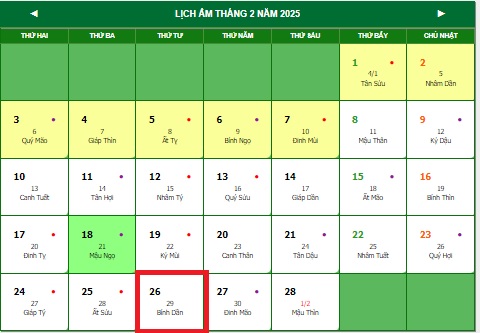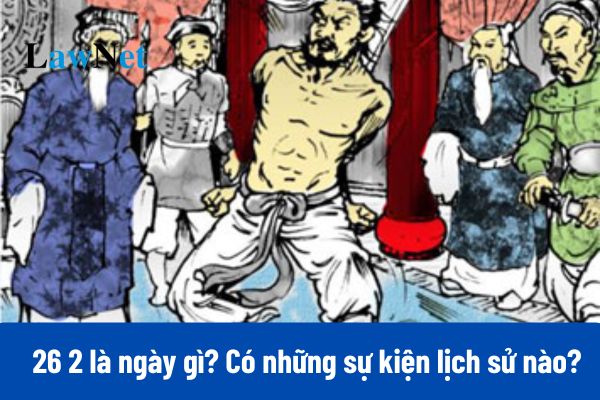What is the meaning of February 26? What are the historical events on this date? What are the objectives of the History curricula at the upper secondary school in Vietnam?
What is the meaning of February 26? What are the historical events on this date?
According to the Lunar Calendar for February 2025:

Thus, February 26, 2025, falls on a Wednesday, corresponding to the 29th day of the 1st lunar month.
February 26 is an ordinary day in the year but also denotes several events and special meanings domestically and in some places worldwide. To be specific:
(1) Historical events in the country on February 26
- February 26, 1285, the renowned general Tran Binh Trong was killed by the Mongol-Yuan invaders at the age of 26. General Tran Binh Trong was born in 1259, in Bao Thai village, Thanh Liem district, Ha Nam province. On February 26, 1285, Tran Binh Trong led a troop to fight the Mongol-Yuan at Tuc Mac and was captured. The Mongol-Yuan tried to bribe him to surrender by offering to make him a king, but he boldly replied, “I would rather be a ghost of the South than a king of the North.”
- February 26, 1949, President Ho Chi Minh wrote a letter to Nursing School of Interzone 1, instructing: “Nursing is not just a profession, but also an obligation. Nurses not only help to cure diseases but must also promote hygiene. In maintaining and enhancing the health of the nation, nurses have a significant role. Therefore, nurses are warriors fighting illness to protect the strong resistance of our race. These nursing warriors must have the will to endure hardships and challenges and must be rich in compassion and self-sacrifice.”
- February 26, 1956, on page 724 of the newspaper Nhan Dan, President Ho Chi Minh wrote the article “Absolutely do not underestimate the enemy,” under the pen name C.B. He stated, “Drought is also an enemy; we should not underestimate it.” At the time, our country was entering the socialist construction in the North and struggling for liberation in the South for national unification. Faced with drought conditions severely affecting people's production, Ho Chi Minh criticized some local officials for neglecting drought prevention and control work. He also reminded local officials and governments to be highly responsible, not to underestimate drought, as it is a major “enemy.”
- February 26, 1966: The South Korean army’s Tiger Division massacred 380 South Vietnamese civilians.
- February 26, 1969, The Liberation Army attacked the enemy base at Dong Du. Dong Du was like a steel gate securing the north of Saigon. To protect this base, the U.S. had destroyed a vast area comprising 7 communes, established barbed-wire fences, strong firepower, and advanced electronic devices to detect human shadows. After 40 minutes of battle, the Gia Dinh Liberation Army turned this base into a grave for the U.S. “Tropical Lightning” soldiers, killing 1,270, destroying four ammunition warehouses, a fuel depot, and demolishing 125 aircraft of various types and 179 military vehicles.
- From February 26 to March 2, 1973, an international conference on Vietnam took place in Paris. The conference included delegates from four parties, five major countries (Soviet Union, China, United Kingdom, France, U.S.), four countries in the International Kontroll- and Oversight Commission (Poland, Hungary, Canada, Indonesia), and the United Nations Secretary-General as an observer.
The conference signed the Accord affirming and committing to respect the documents of the Paris Agreement. The value of the Paris Agreement increased, and the position of the Democratic Republic of Vietnam and the Provisional Revolutionary Government of South Vietnam was raised.
- February 26, 1973, Vietnam established diplomatic relations with Australia.
- February 26, 2003, The Prime Minister of Vietnam issued Decision No. 225/QD-TTg approving the comprehensive project on the conservation, restoration, and promotion of the historical site of the Dien Bien Phu victory.
(2) Historical events in the world on February 26
- February 26, 364 – Flavius Valentinianus was selected as the successor to Roman Emperor Jovianus.
- February 26, 684 – Empress Wu Zetian dethroned her son, Tang Zhongzong Li Xian, making him Prince of Luling, equivalent to the day Mau Ngo (6), month 2, year Giap Than.
- February 26, 1233 – Mongol–Jin War: The Mongol army captured the capital of Jin, Kaifeng, after months of siege.
- February 26, 1606 – Dutch explorer Willem Janszoon became the first recorded European to land in Australia; however, he thought he was in New Guinea.
- February 26, 1815 – Napoleon Bonaparte escaped from Elba, an island off the coast of Italy where he was exiled following the signing of the Treaty of Fontainebleau a year prior.
- February 26, 1919 – President Woodrow Wilson signed into law designating the Grand Canyon of the Colorado River as a national park.
- February 26, 1935 – Adolf Hitler reestablished the German air force, Luftwaffe, violating the Treaty of Versailles agreed upon at the end of World War I.
- February 26, 1971 – The Japanese Red Army was established in Palestine by leftist individuals from Japan, and the organization continued until 2001.
- February 26, 1992 – Nagorno–Karabakh War: Armenian forces massacred hundreds of Azerbaijani civilians outside the commune-level town of Khojaly.
- February 26, 1993 – World Trade Center bombing: In New York City, a truck loaded with explosives parked below the North Tower of the World Trade Center exploded, killing 6 and injuring over a thousand people.
Note: Information is for reference only!

What is the meaning of February 26? What are the historical events on this date? (Image from the Internet)
What are the objectives of the History curricula at the upper secondary school in Vietnam?
Under Section 3 of the General Education Program promulgated together with Circular 32/2018/TT-BGDDT amended by Article 2 Circular 13/2022/TT-BGDDT, the objectives of the History curricula at the upper secondary school in Vietnam are as follows:
The History curriculum helps students develop historical competence, as an expression of the scientific capacity formed at the junior high school level; contributes to educating national spirit, patriotism, the good traditional values of the nation, and the cultural essence of humanity, the qualities, and competencies of Vietnamese citizens, global citizens suitable with the development trend of the era; aids students in accessing and clearly understanding the role and characteristics of historical science as well as the connection between history and other scientific fields and professions, laying the foundation for students to orient future careers.
What are the characteristics of History at the upper secondary level in Vietnam?
According to the General Education Program issued with Circular 32/2018/TT-BGDDT, the characteristics of History at the upper secondary level in Vietnam are stipulated as follows:
- History is a subject belonging to the group of Social Sciences, selected based on career orientation at the upper secondary level.
- History aims to help students form and develop historical capabilities, a component of scientific capacity, while also contributing to the formation and development of the key qualities and general abilities identified in the overall program.
- History plays a leading role in educating patriotism, national pride, historical traditions, and national culture. It helps students recognize and apply historical lessons to solve real-life problems, develop vision, and consolidate human values, community spirit, tolerance, and compassion; contributing to forming and developing the qualities of Vietnamese citizens, and global citizens in the era's developmental trend.
- History forms and develops historical thinking, systematic thinking, critical thinking, skills in exploiting and using historical sources, recognizing, and presenting history logically across different times and spaces, and connecting the past with the present.
- History helps students recognize the scientific and practical value of history in modern social life, fostering an understanding and love for national and human history and culture; guiding students towards career choices such as social and humanities research, diplomacy, management, tourism activities, cultural industries, information, and communication, etc.
- The History curriculum systematizes and consolidates general historical knowledge at the basic education stage while helping students delve deeper into core historical knowledge through subjects and topics about world history, Southeast Asian history, and Vietnamese history. The teaching methods of History are implemented based on fundamental historical principles and modern educational methods.

